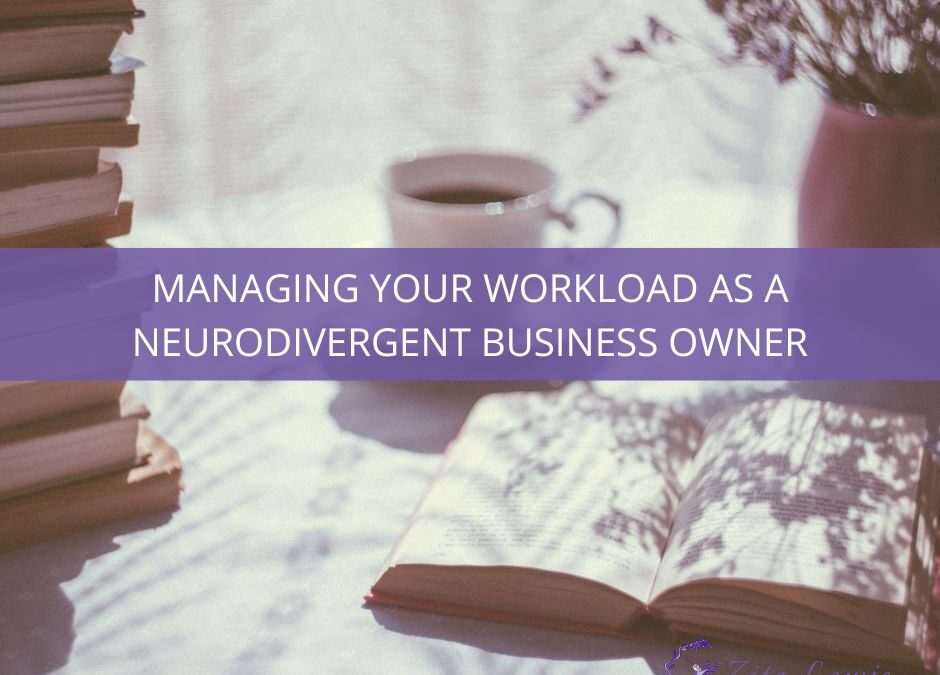Strategies for Success as a Neurodivergent Business Owner
If you are a neurodivergent business owner, you know first-hand the challenges of managing your workload. Having a neurodivergent condition can make it difficult to stay focused, prioritise tasks and manage time effectively. However, with the right strategies in place, you can manage your workload and run a successful business.
In this blog, I’ll be sharing my top tips for managing your workload as a neurodivergent business owner.
What is neurodivergence?
Our brains are all different – that’s what makes us unique! We call this range of differences ‘neurodiversity’ however some individuals have neurological differences which means their brain is very different from what is considered ‘typical’ and we call this ‘neurodivergence’.
An analogy you might hear used is that most individuals run on a windows operating system whereas neurodivergent people are running on Mac OS, or Linux. All systems do the same thing and are fundamentally the same but they all work quite differently from each other, with different strengths and limitations.
Common neurodivergent conditions include Autism, ADHD, Dyslexia, Dyscalculia, Tourette syndrome and many more. It’s also important to remember that there is diversity within these conditions and so every neurodivergent individual is unique, with their own strengths and limitations, just like everyone else.
Being neurodivergent does make life harder
Forget about functioning labels and ‘severity’, if you’re neurodivergent then you understand just how difficult life can be when you’re wired differently to everyone else. When the world is designed to run on Windows and you’re not, figuring out how to get by can be difficult (and stressful!)
So it’s probably no surprise that a lot of neurodivergent individuals become freelancers or self-employed. Being your own boss makes it so much easier to succeed than trying to juggle the expectations of being an employee. But being self-employed comes with its own unique set of challenges particularly when it comes to ‘executive functioning’.
Most neurodivergent conditions have executive functioning issues as a symptom. Executive functioning is essentially the ‘organising’ side of your brain, it’s the part that manages how you plan, prioritise, remember and implement tasks. If you’ve ever made a cup of tea, been distracted by something and completely forgotten about your tea until hours later – that’s your executive functioning to blame.
When you’re self-employed, executive functioning is the foundation of your workload. So if yours isn’t quite working as it should and you forget meetings, struggle to get started on tasks, prioritise the wrong things or other issues, that’s going to make your working life difficult to manage.
Top tips for managing your workload as a neurodivergent freelancer
It’s not all doom and gloom though. There are many successful neurodivergent freelancers and business owners who have found ways to navigate their executive functioning issues, and here are a few tips on how they have done just that.
Understand your strengths and limitations
The first step in managing your workload is to understand your strengths and limitations. Take the time to identify your strengths and what you’re good at. Acknowledge your limitations and areas where you struggle. Once you have a clear understanding of your strengths and limitations, you can work with them rather than trying to work against them.
A good example of this is your working hours. Many people with neurodivergent conditions struggle with the conventional ‘9 to 5’ working day. As a freelancer, you can decide when you want to work, so a 12 – 7 might be a better option for you, or a 5 – 2 if you’re an early bird. It doesn’t matter when you choose to work so long as it works for you.
Choose work that interests you
When you’re interested in the work you do it’s less stressful than trying to work through something that feels like a chore and stress can worsen neurodivergent difficulties. There are always going to be some aspects of your workload that are less enjoyable and that’s ok. By sandwiching them between the tasks you do love, it can be easier to get through them knowing it’ll get interesting again afterward!
Break down tasks into manageable chunks
Breaking down tasks into manageable chunks is especially helpful for neurodivergent individuals. It can be overwhelming to tackle a large project all at once. Instead, break it down into smaller steps that are more manageable. This can help you stay focused and avoid feeling overwhelmed.
Take breaks and practice self-care
Taking breaks and practicing self-care is essential for maintaining productivity and good mental health. Make sure you take regular breaks throughout the day, even if it’s just a few minutes to stretch or take a walk. Incorporate self-care activities into your routine, such as exercise, meditation, or reading a book.
Seek support from others
Don’t be afraid to seek support from others. This includes outsourcing the tasks you really struggle with to other freelancers or hiring a VA to help you manage your workload better. I support my neurodivergent clients through admin and business support along with lifestyle management services, so any of those overwhelming or difficult-to-do tasks can be completed successfully.
Managing your workload as a neurodivergent business owner can be challenging but it’s not impossible. Hopefully, you’ve found these tips useful and remember to experiment with different strategies and find what works best for you. With the right tools and support, you can achieve your goals and thrive in your business.
And if you’d like some additional support in your business, get in touch now for a friendly chat on the different ways I can assist you.

